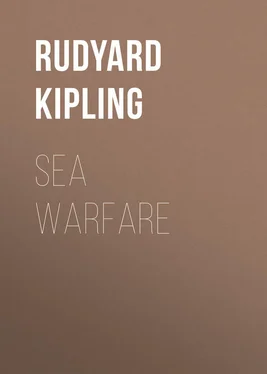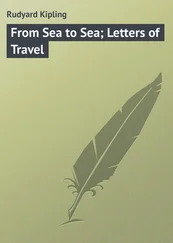Rudyard Kipling - Sea Warfare
Здесь есть возможность читать онлайн «Rudyard Kipling - Sea Warfare» — ознакомительный отрывок электронной книги совершенно бесплатно, а после прочтения отрывка купить полную версию. В некоторых случаях можно слушать аудио, скачать через торрент в формате fb2 и присутствует краткое содержание. Жанр: literature_20, Поэзия, foreign_antique, foreign_prose, на английском языке. Описание произведения, (предисловие) а так же отзывы посетителей доступны на портале библиотеки ЛибКат.
- Название:Sea Warfare
- Автор:
- Жанр:
- Год:неизвестен
- ISBN:нет данных
- Рейтинг книги:4 / 5. Голосов: 1
-
Избранное:Добавить в избранное
- Отзывы:
-
Ваша оценка:
- 80
- 1
- 2
- 3
- 4
- 5
Sea Warfare: краткое содержание, описание и аннотация
Предлагаем к чтению аннотацию, описание, краткое содержание или предисловие (зависит от того, что написал сам автор книги «Sea Warfare»). Если вы не нашли необходимую информацию о книге — напишите в комментариях, мы постараемся отыскать её.
Sea Warfare — читать онлайн ознакомительный отрывок
Ниже представлен текст книги, разбитый по страницам. Система сохранения места последней прочитанной страницы, позволяет с удобством читать онлайн бесплатно книгу «Sea Warfare», без необходимости каждый раз заново искать на чём Вы остановились. Поставьте закладку, и сможете в любой момент перейти на страницу, на которой закончили чтение.
Интервал:
Закладка:
Rudyard Kipling
Sea Warfare
THE FRINGES OF THE FLEET
In Lowestoft a boat was laid,
Mark well what I do say!
And she was built for the herring trade,
But she has gone a-rovin', a-rovin', a-rovin',
The Lord knows where!
They gave her Government coal to burn,
And a Q.F. gun at bow and stern,
And sent her out a-rovin', etc.
Her skipper was mate of a bucko ship
Which always killed one man per trip,
So he is used to rovin', etc.
Her mate was skipper of a chapel in Wales,
And so he fights in topper and tails —
Religi-ous tho' rovin', etc.
Her engineer is fifty-eight,
So he's prepared to meet his fate,
Which ain't unlikely rovin', etc.
Her leading-stoker's seventeen,
So he don't know what the Judgments mean,
Unless he cops 'em rovin', etc.
Her cook was chef in the Lost Dogs' Home,
Mark well what I do say!
And I'm sorry for Fritz when they all come
A-rovin', a-rovin', a-roarin' and a-rovin',
Round the North Sea rovin',
The Lord knows where!
THE AUXILIARIES
The Navy is very old and very wise. Much of her wisdom is on record and available for reference; but more of it works in the unconscious blood of those who serve her. She has a thousand years of experience, and can find precedent or parallel for any situation that the force of the weather or the malice of the King's enemies may bring about.
The main principles of sea-warfare hold good throughout all ages, and, so far as the Navy has been allowed to put out her strength , these principles have been applied over all the seas of the world. For matters of detail the Navy, to whom all days are alike, has simply returned to the practice and resurrected the spirit of old days.
In the late French wars, a merchant sailing out of a Channel port might in a few hours find himself laid by the heels and under way for a French prison. His Majesty's ships of the Line, and even the big frigates, took little part in policing the waters for him, unless he were in convoy. The sloops, cutters, gun-brigs, and local craft of all kinds were supposed to look after that, while the Line was busy elsewhere. So the merchants passed resolutions against the inadequate protection afforded to the trade, and the narrow seas were full of single-ship actions; mail-packets, West Country brigs, and fat East Indiamen fighting, for their own hulls and cargo, anything that the watchful French ports sent against them; the sloops and cutters bearing a hand if they happened to be within reach.
It was a brutal age, ministered to by hard-fisted men, and we had put it a hundred decent years behind us when – it all comes back again! To-day there are no prisons for the crews of merchantmen, but they can go to the bottom by mine and torpedo even more quickly than their ancestors were run into Le Havre. The submarine takes the place of the privateer; the Line, as in the old wars, is occupied, bombarding and blockading, elsewhere, but the sea-borne traffic must continue, and that is being looked after by the lineal descendants of the crews of the long extinct cutters and sloops and gun-brigs. The hour struck, and they reappeared, to the tune of fifty thousand odd men in more than two thousand ships, of which I have seen a few hundred. Words of command may have changed a little, the tools are certainly more complex, but the spirit of the new crews who come to the old job is utterly unchanged. It is the same fierce, hard-living, heavy-handed, very cunning service out of which the Navy as we know it to-day was born. It is called indifferently the Trawler and Auxiliary Fleet. It is chiefly composed of fishermen, but it takes in every one who may have maritime tastes – from retired admirals to the sons of the sea-cook. It exists for the benefit of the traffic and the annoyance of the enemy. Its doings are recorded by flags stuck into charts; its casualties are buried in obscure corners of the newspapers. The Grand Fleet knows it slightly; the restless light cruisers who chaperon it from the background are more intimate; the destroyers working off unlighted coasts over unmarked shoals come, as you might say, in direct contact with it; the submarine alternately praises and – since one periscope is very like another – curses its activities; but the steady procession of traffic in home waters, liner and tramp, six every sixty minutes, blesses it altogether.
Since this most Christian war includes laying mines in the fairways of traffic, and since these mines may be laid at any time by German submarines especially built for the work, or by neutral ships, all fairways must be swept continuously day and night. When a nest of mines is reported, traffic must be hung up or deviated till it is cleared out. When traffic comes up Channel it must be examined for contraband and other things; and the examining tugs lie out in a blaze of lights to remind ships of this. Months ago, when the war was young, the tugs did not know what to look for specially. Now they do. All this mine-searching and reporting and sweeping, plus the direction and examination of the traffic, plus the laying of our own ever-shifting mine-fields, is part of the Trawler Fleet's work, because the Navy-as-we-knew-it is busy elsewhere. And there is always the enemy submarine with a price on her head, whom the Trawler Fleet hunts and traps with zeal and joy. Add to this, that there are boats, fishing for real fish, to be protected in their work at sea or chased off dangerous areas whither, because they are strictly forbidden to go, they naturally repair, and you will begin to get some idea of what the Trawler and Auxiliary Fleet does.
Now, imagine the acreage of several dock-basins crammed, gunwale to gunwale, with brown and umber and ochre and rust-red steam-trawlers, tugs, harbour-boats, and yachts once clean and respectable, now dirty and happy. Throw in fish-steamers, surprise-packets of unknown lines and indescribable junks, sampans, lorchas, catamarans, and General Service stink-pontoons filled with indescribable apparatus, manned by men no dozen of whom seem to talk the same dialect or wear the same clothes. The mustard-coloured jersey who is cleaning a six-pounder on a Hull boat clips his words between his teeth and would be happier in Gaelic. The whitish singlet and grey trousers held up by what is obviously his soldier brother's spare regimental belt is pure Lowestoft. The complete blue-serge-and-soot suit passing a wire down a hatch is Glasgow as far as you can hear him, which is a fair distance, because he wants something done to the other end of the wire, and the flat-faced boy who should be attending to it hails from the remoter Hebrides, and is looking at a girl on the dock-edge. The bow-legged man in the ulster and green-worsted comforter is a warm Grimsby skipper, worth several thousands. He and his crew, who are mostly his own relations, keep themselves to themselves, and save their money. The pirate with the red beard, barking over the rail at a friend with gold earrings, comes from Skye. The friend is West Country. The noticeably insignificant man with the soft and deprecating eye is skipper and part-owner of the big slashing Iceland trawler on which he droops like a flower. She is built to almost Western Ocean lines, carries a little boat-deck aft with tremendous stanchions, has a nose cocked high against ice and sweeping seas, and resembles a hawk-moth at rest. The small, sniffing man is reported to be a "holy terror at sea."
Читать дальшеИнтервал:
Закладка:
Похожие книги на «Sea Warfare»
Представляем Вашему вниманию похожие книги на «Sea Warfare» списком для выбора. Мы отобрали схожую по названию и смыслу литературу в надежде предоставить читателям больше вариантов отыскать новые, интересные, ещё непрочитанные произведения.
Обсуждение, отзывы о книге «Sea Warfare» и просто собственные мнения читателей. Оставьте ваши комментарии, напишите, что Вы думаете о произведении, его смысле или главных героях. Укажите что конкретно понравилось, а что нет, и почему Вы так считаете.












